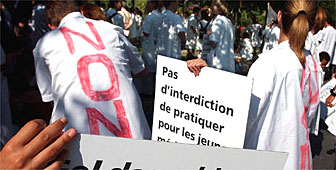Doctors protest against freeze on private practices

Junior doctors across Switzerland have demonstrated against government plans to prevent the opening of any new private practices for three years.
Wearing red items of clothing to symbolise their anger and alarm, more than 3,000 protestors took part in a series of marches and one-day strikes, organised by the Junior Doctors Assocation.
The doctors have dismissed government claims that the freeze will help reduce spiralling health costs.
The cabinet is expected to announce its decision next week.
Rising costs
Switzerland has about 14,000 doctors in private practice and each year about 300 newcomers join their ranks.
Supporters of the new measure say more private practitioners mean increased healthcare costs. Under the Swiss system, health insurance companies are obliged to pay for all chargeable treatment provided by any practising doctor under a patient’s basic insurance plan.
“Every new doctor we have on the market costs social insurance about SFr500,000,” said Fritz Britt, vice-director of the federal office for social insurance.
This view is not shared by the Swiss Medical Association, which is opposed to the moratorium.
“Health costs don’t increase because of the number of medical practices,” Association spokesman, Reto Steiner, told swissinfo. “They increase mainly because of the progress of medicine. Today you can do things you didn’t even dream about five or ten years ago, and that costs a lot of money.
“Secondly, this measure affects only the young doctors who plan to open a practice. What do they do during these three years of the moratorium? They can’t stay working at the hospitals because these jobs are only temporary. And what happens after three years. Does everyone then apply to open a new practice?”
Personal dilemma
Matthias Winistörfer, president of the Junior Doctors Association, is himself caught in the dilemma.
He has just completed his fourth year of postgraduate medical education and, within a year, would normally be eligible to open his own private practice.
“This is going to affect my plans for the future very directly and very immediately,” he told swissinfo.
“Usually you take six to twelve months to plan to open your private practice or to take over from a general practitioner who is retiring, so I would be starting to plan in the next few months.”
Winistörfer said it was simply not true that more doctors meant rising costs. He said other countries like Germany and the United States had implemented similar measures without success.
He added that the ability to treat more diseases coupled with the growing demands of the general public who expect the latest treatment were issues that needed to be addressed.
“The politicians or ultimately the people need to decide when we stop applying all the methods we have at our disposal,” he told swissinfo.
“If we want to limit the number of physicians, we need to have different criteria and not just make the young ones wait two or three years.
“We want quality of service to be a major criterion for who is allowed to have a private practice and who the insurance companies cooperate with.”
Clamouring at the gate
Under the bilateral agreements with the European Union which came into force in June, medical personnel from the EU have the opportunity to practice their profession in Switzerland.
Up to 3,500 doctors from EU countries already live in Switzerland and the Swiss expect some immigration, chiefly of doctors based near the Swiss border.
However, preferential treatment for Swiss citizens will apply for a period of two years.
“We don’t know the numbers yet, but in the southern part of Germany, there are lots of doctors who have the same education and the same professional background as doctors we already have in Switzerland and they are just waiting for the opening of the frontiers,” Britt told swissinfo.
However, Steiner is not convinced that there are too many doctors in Switzerland. He said that the number of doctors differed greatly between cantons and between city and countryside.
“If you are in a city, you can always find a doctor, but I know regions or cantons which are desperately looking for doctors,” he said.
Next step
Officials do not anticipate a sudden rush of doctors applying to set up practice after the three-year moratorium has expired. It is seen as a temporary measure to give the government time to enact sweeping healthcare legislation.
Although young doctors are hardest hit by the new law, other professions such as physiotherapists and chiropractors whose treatment is also allowed on compulsory insurance will be similarly affected.
Meanwhile, the Junior Doctors Association is holding a meeting on Saturday to decide its next step.
by Vincent Landon

In compliance with the JTI standards
More: SWI swissinfo.ch certified by the Journalism Trust Initiative








You can find an overview of ongoing debates with our journalists here . Please join us!
If you want to start a conversation about a topic raised in this article or want to report factual errors, email us at english@swissinfo.ch.